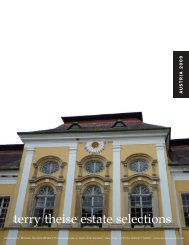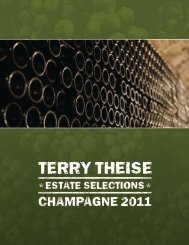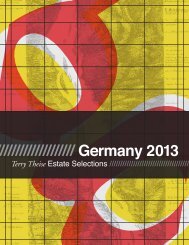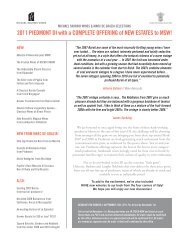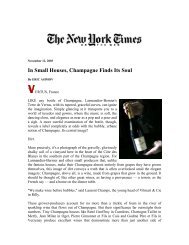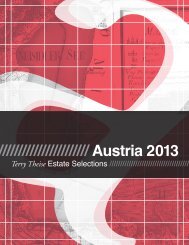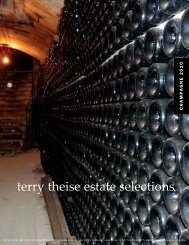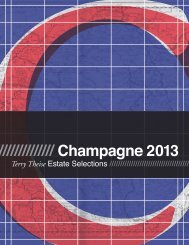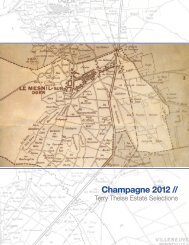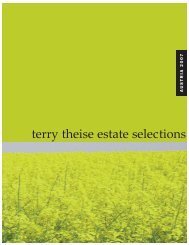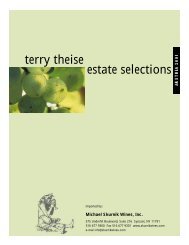German Catalog 2006 USE THIS ONE.qxp - Michael Skurnik Wines
German Catalog 2006 USE THIS ONE.qxp - Michael Skurnik Wines
German Catalog 2006 USE THIS ONE.qxp - Michael Skurnik Wines
Create successful ePaper yourself
Turn your PDF publications into a flip-book with our unique Google optimized e-Paper software.
I would ask the pragmatists to consider this<br />
question. How, in a world of wines made by an<br />
indisputably prevailing set of practices in pursuit<br />
of a given result, will there still be room for the<br />
quirky, the asymmetrical, the evocative? Or, are<br />
we content to permit such wines to disappear? Is<br />
this the wine-world—is it the world—in which we<br />
wish to live? If not, how do we prevent it?<br />
I am not placing value judgements on<br />
“modern” methods. Many of them are benign.<br />
Nor is this the time to argue against the falsifications.<br />
Some people think it’s fine for ballplayers<br />
to use steroids! I am asking for consideration of<br />
the consequences inherent in a belief system. It is<br />
certainly true that regions such as, say, Priorat,<br />
were unknown and unavailable twenty years<br />
ago. Yet to my palate this signifies very little, for<br />
Priorat’s wines join an international glom of hotclimate<br />
reds whose wines are, in the old phrase,<br />
much of a muchness. Yes, there is another (yet<br />
another) source of big-ass reds. I’m not sure why<br />
I should care.<br />
In cuisine there comes a point of ennui when<br />
all one sees are the same luxury ingredients in<br />
nearly interchangeable preparations. Monday<br />
it’s squab stuffed with foie gras in a truffle nage:<br />
Tuesday it’s squab stuffed with truffles in a foie<br />
emulsion; Wednesday it’s truffle-crusted foie<br />
gras in a squab jus, and eventually it becomes a<br />
meaningless farandole of dishes constituting the<br />
luxury-dining-experience, which you could have<br />
in Hong Kong or Los Angeles or Las Vegas or<br />
New York or Kuala Lampur. It becomes a membrane<br />
separating you from the world, swaddling<br />
you in a specious bliss, seducing your senses. I<br />
imagine this when I taste yet another big wine<br />
indistinguishable from myriad other Big <strong>Wines</strong>,<br />
and yes, it might well be superior to the weird<br />
little wine that grew there before—might be—but<br />
what does it signify? That people in many different<br />
places can suss the formula and apply it?<br />
I’m not sure why I should care.<br />
And yet we romantics must yield the point:<br />
the floor has risen, and this is a good thing. Our<br />
struggle is to applaud this while protecting the<br />
ceiling. And the “ceiling” isn’t merely new<br />
stratospheres of hedonism (even more ripe fruit,<br />
even more intensity: more more MORE) but<br />
rather those wines uniquely great. What other<br />
great wine is great as the best Loire Chenins are<br />
great? As the best Barolos are great? As the best<br />
Jurançons, the best Mosel Rieslings, the best<br />
Grüner Veltliners, the best Grand Cru Chablis?<br />
Ultimately it isn’t greatness we must protect—it<br />
is uniqueness. Preserve the unique, and greatness<br />
will take care of itself.<br />
The pragmatists need to realize there are<br />
risks inherent in their aesthetic.<br />
And we romantics need to realize certain<br />
things too.<br />
We have misapplied the concept of terroir to<br />
excuse flawed wines. This concept is precious.<br />
We need to respect it, and use it with care.<br />
We have been guilty of a form of puritanism;<br />
if it tastes unpleasant it must be virtuous.<br />
The pragmatists ought in turn to acknowledge<br />
theirs isn’t the only form of pleasure. There<br />
are worlds alongside the sensual, and wine can<br />
be intellectually and spiritually nourishing, and<br />
people can desire these experiences, and the true<br />
hedonist isn’t threatened by them.<br />
I wonder if we cannot all unite behind the<br />
value of diversity. I would like to think so. From<br />
my high-rise window I can often see raptors<br />
soaring and swooping through the sky, and I<br />
love these big graceful birds. But I could never<br />
imagine myself feeling “I sure love these big<br />
hawks, and other big birds too, eagles, buzzards,<br />
and I sure wish all birds were like these because<br />
they give me such pleasure.” What of the<br />
assertive red cardinal? The graceful heron? The<br />
silly woodpecker? The pensive dove? I want to<br />
live in a world of thousands of different wines,<br />
whose differences are deeper than zip-code,<br />
each one of which shows me the unending variety<br />
and fascination of this lovely bit of green on<br />
which we walk.<br />
107



